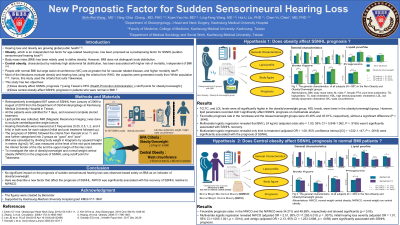Otology/Neurotology
(332) New Prognostic Factor for Sudden Sensorineural Hearing Loss
Monday, October 2, 2023
2:45 PM - 3:45 PM East Coast USA Time


Shih Wei Wang, MD
Resident
Kaohsiung medical university hospital
Kaohsiung, Kaohsiung, Taiwan (Republic of China)
Presenting Author(s)
Disclosure(s):
Shih Wei Wang, MD: No relevant relationships to disclose.
Introduction: To investigate the role of normal weight central obesity (NWCO) in the prognosis of sudden sensorineural hearing loss (SSNHL).
Methods: We retrospectively investigated 807 cases of SSNHL from January 2008 to August 2019 from the Department of Otorhinolaryngology at a single medical center in southern Taiwan. All the included subjects had complete audiometry examinations, image studies, lipid profile surveys, and body figure measurements recorded, meanwhile, they all received standard treatment protocol from the institution; subjects were excluded if the collected data were missing or did not complete the standard treatment protocol. We analyzed the association between overweight and obesity, normal weight central obesity, and the prognosis of SSNHL. The demographic and clinical characteristics, audiometry results, and outcomes were also reviewed.
Results: The nonobese (body mass index [BMI] < 24 kg/m2) and overweight and obese groups (BMI ≥ 24 kg/m2) comprised 343 (42.50%) and 464 (57.50%) patients, respectively. The favorable prognosis rates in the nonobese and the overweight and obese groups were 45.48% and 45.91%, respectively, without a significant difference (P = .9048). Multivariate logistic regression revealed that BMI (adjusted odds ratio [aOR] = 1.00, 95% CI = 0.948-1.062, P = .9165) was not significantly associated with SSNHL recovery. The normal weight noncentral obesity (NWNCO) and NWCO groups comprised 266 (77.55%) and 77 (22.45%) patients, respectively, and had favorable prognosis rates of 48.50% and 35.06%, respectively. The difference between the groups was significant (P = .0371). Multivariate logistic regression analysis revealed that NWCO (aOR = 2.51, 95% CI = 1.292-5.019, P = .0075) was significantly associated with SSNHL recovery.
Conclusions: NWCO may significantly affect the prognosis of SSNHL.
